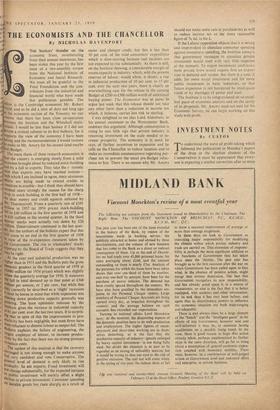HE ECONOMISTS AND THE CHANCELLOR
int le
By NICHOLAS DAVENPORT
THE bankers' thunder on the economic front, reverberating from their annual statements, has been stolen this year by the first issue of a two-monthly review from the National Institute of Economic and Social Research. We must all be grateful to the Ford Foundation and the con- tributors from the industrial and
financial world who have made
this publication possible. The
I Y.
editor is the Cambridge economist Mr. Robert la eild„ and as he did a stint of duty not long ago n the economic section of the Treasury we can ssume that there has been close co-operation etween the Institute and the Whitehall statis- Mans. I would be less than human if I did not levote a critical column to its first bulletin, for it tupports the view of the economy I have been taking and the recommendations I 'would venture 1ei make to Mr. Amory for his second (and maybe last) Budget.
The main thesis of these research economists is
that the country is emerging slowly from mild in recession brought about by reduced stock-building th and by a fall in exports. They take the c timistic rict view that exports may have reached bottom— ea which I am inclined to agree, since strenuous tl) efforts are being made to extend credits to ro countries in trouble—but I think they should have
stressed more strongly the reason for the sharp
uro- P in stock-building in the first half of 1958— the dear money and credit squeeze initiated by it I*. Thorneycroft. From a quarterly rate of £101 Million in 1957 (at 1954 prices) stock-building .re fell to £40 million in the first quarter of 1958 and rn to £10 million in the second quarter. In the third ht quarter stocks were actually run down by £20 he million. Disinvestment continued in the last guar- es ter, but the authors of the bulletin expect that this will come to an end in the first quarter of 1959 11 hi view of the re-expansion measures taken by ill the Government. The rise in wholesalers' stocks reported by the Board of Trade suggests that they it InaY be right.
1' At the year end industrial production was no 11,1Cher than in 1955 and the Bulletin puts the gross domestic product in the third quarter of 1958 at t3 fi80 million (at 1954 prices) which was slightly
below the quarterly average for 1956. It measures the fall in total demand up to that point at £368
Iltillion per annum, or 2 per cent., but while this nIttY correctly be described as a 'slight' recession it Must be borne in mind that while expansion was stowing down productive capacity generally was 't.owing. The least optimistic estimate by the institute gives the increase in industrial capacity 'It 64 per cent. over the last two years. It is surpris- Ing that in spite of this the improvement in pro- ' 'Ioetivity has been negligible, but most firms have been reluctant to dismiss labour as output fell. The Bulletin explains the failure of engineering, the linlest employer of labour, to increase produc- , , by the fact that there was no strong pressure 'O reduce costs. The upshot of this analysis is that the recovery 4aged is hot strong enough to make anyone feel very confident and vote Conservative. The general level of demand is only likely to rise gradually. So are exports. Fixed investment will not change substantially, for the expected increase in Public investment will merely offset a slight decline in private investment. Consumer spending On durable goods has risen sharply as a result of
RI thi vt
ce coJl al' easier and cheaper credit, but this is less than 10 per cent. of the total consumers' expenditure which is slow-moving because real incomes are not expected to rise substantially. As there is still, on the Institute showing, a considerable margin of excess capacity in industry, which, with the present reserves of labour, would allow, it thinks, a rise in industrial production of 10 per cent. to 15 per cent. over the next two years, there is clearly an overwhelming case for the release in the coming Budget of £200 to £300 million worth of additional buying power. The Economist was at pains to argue last week that this release should not take any other form than a reduction in income tax which, it believes, carries less risk to sterling.
I was delighted to see that Lord Aldenham, in his annual statement to the Westminster Bank, endorses this argument. Although consumption is rising he sees little sign that private industry is resuming investment on the scale needed to in- crease prosperity. The economy is in need, he says, of further incentives to expansion and he calls on the Chancellor to reduce taxation and to make an immediate announcement regarding pur- chase tax to prevent the usual pre-Budget reluc- tance to buy. There is no reason why Mr. Amory
should not make some cuts in purchase tax as well as reduce income tax to the more reasonable • figure of 7s. 6d. in the £.
If the Labour opposition objects that it is wrong and improvident to stiniulate consumer spending against investment spending, the Institute answers that government measures to stimulate private investment would meet with very little response at the moment. To regain investment confidence most private firms would require first an expan- sion in demand and output. But there is a case, it adds, for more social investment and for more public investment in basic industries, so that future expansion is not hampered by inad,:quate roads or by shortages of power and steel.
The Institute is to be congratulated on an excel- lent piece of economic analysis and on the sanity of its proposals. Mr. Amory need not wait for his Economic Survey; he can begin working on this study with profit.










































 Previous page
Previous page